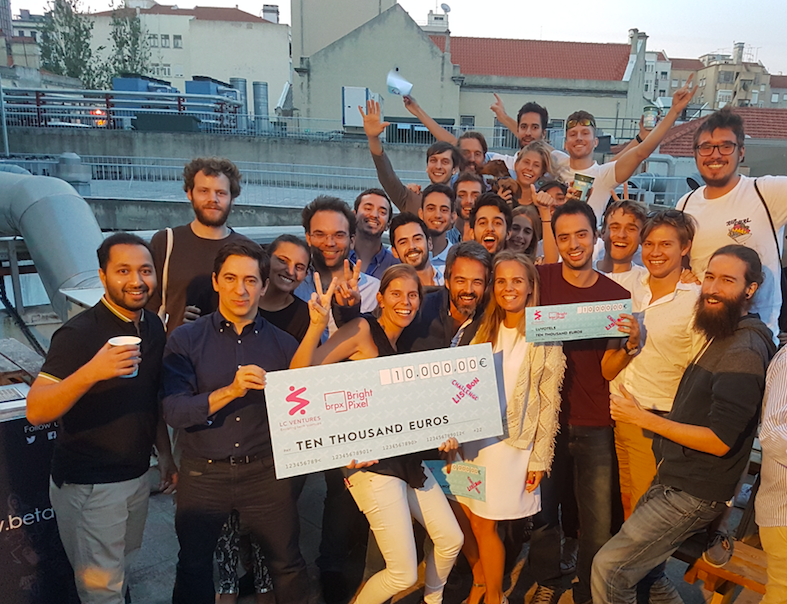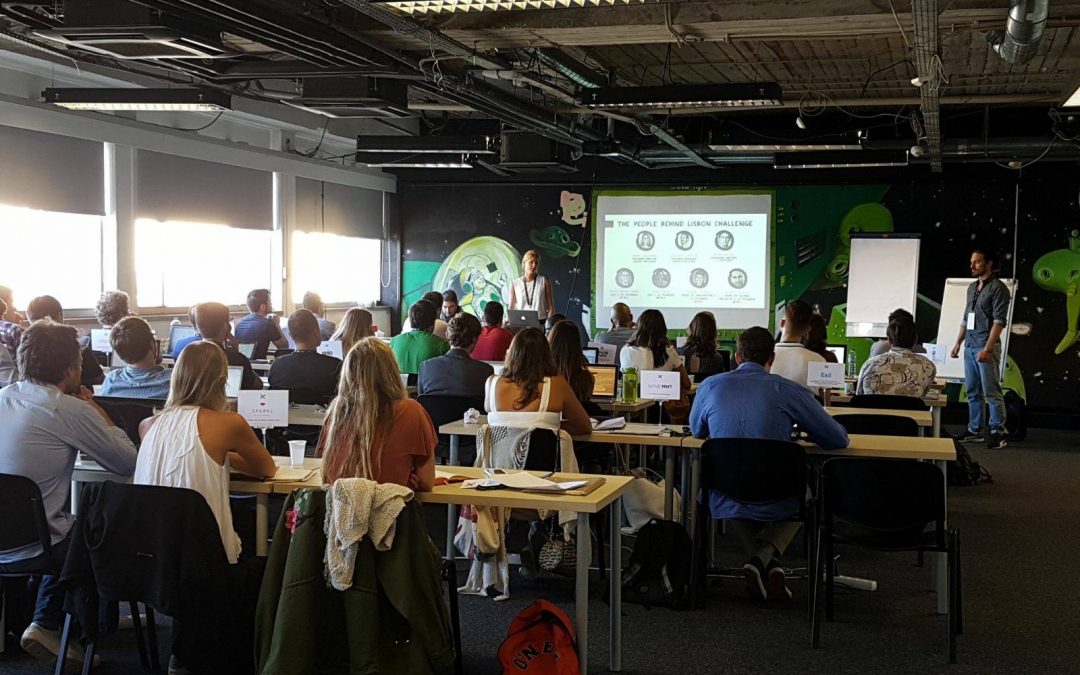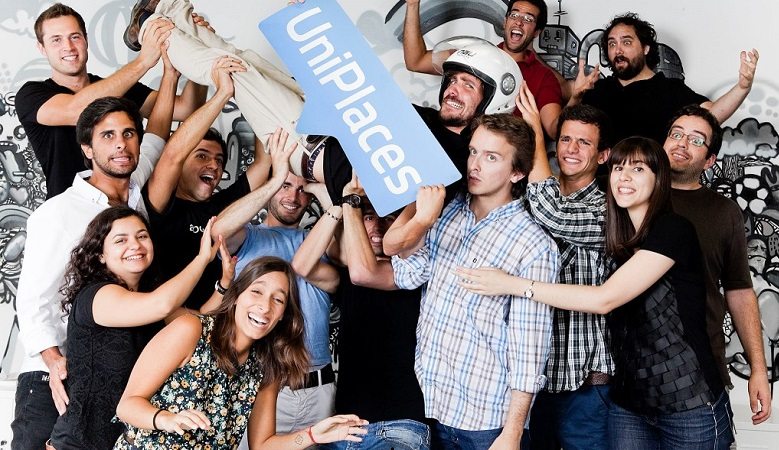
by Beta-i | Sep 25, 2017 | Investors
The Lisbon Challenge has just concluded the first stage of the program, the dreaded Bootcamp. After a careful selection process, we finally made the difficult decision of selecting 9 startups to join our accelerator and to receive initial investment.
Meet the 9 selected startups
- City Check – a location-based game app that allows families to play contextual games and find awesome characters while visiting the world;
- Luvotels – the booking.com for motels. Last minute, by-the-hour, discrete bookings of a room when passion can’t wait. Built on Ruby on Rails;
- MonitorFish – fish farming made easy using cognitive capabilities of artificial intelligence to ensure high quality and quantity of fish output;
- Parkio – connecting drivers with parking spaces. Parkio helps drivers to find parking and pay for parking on the go;
- Placeme – an online app that allows entrepreneurs to choose the location for their business by predicting sales potential and help manage it afterwards;
- Reckon.ai – a SaaS application that automates price optimisation, helping retailers to have the right product in the right place with the best price;
- Sparkl – offering ‘Beauty on Demand’, providing beauty services wherever you are;
- Tiger Time – a simple, yet powerful time management app that uses the leading productivity systems to help busy people study better and work harder;
- Wine MNT – the match.com for the wine industry. Wine MNT joins the two main players of the wine supply chain – producers and importers/distributers.
So, what have the startups learned so far?
The Bootcamp was an intensive week that lasted from the 4th until the 8th of September, where the teams worked on the initial steps of their business. All the startups worked with the business model canvas, made financial projections, defined their go to market strategy, drafted a competitive analysis, and presented their pitch decks. After 5 days of hard work, we were able to ultimately choose the teams to move on to the acceleration phase.
What can the startups expect from the next phase?
Now, the 9 promising startups will be going through the second phase of the Lisbon Challenge. During the acceleration, they’ll have the time to focus on validating their business, developing their product, and launching their startup from Lisbon to the world.
At the end, up to 4 startups will receive an additional 50K funding and 6 months of office space.
This article was originally posted on the Lisbon Challenge Blog.

by Beta-i | Sep 25, 2017 | Startups
Hosting early-stage startups in such demanding week brought to us several learnings. One of the things we noticed was that several of them didn’t yet have a clearly defined competitive advantage, which wasn’t challenging them enough to think about how powerful their value proposition was.
A proper competitive analysis can help understand who are your competitors, which strategies they are using and how successful they are being with it, how you can predict their future actions or even reactions to your offer. And this can benefit your startup by having a better focus in the marketing strategy; identifying under-served opportunities in the market; taking advantage of competitors weakness to boost the market share, and making better-informed decisions. But essentially, a well-defined competitive advantage is the basis for any startup’s unique value proposition, and a continuous analysis this should be part of every startup’s DNA.
Here is our competitive analysis template that we use to work with the startups. It’s pretty basic, and it’s only one way of doing it, so let’s break it down:
Overview and profile: Who are your competitors? What’s their unfair advantage as a team? Where are they based? Who are their key-advisors? What’s their previous funding? How big? Are they working on a short-term vision or long-term vision? What’s their business model?
Competitive advantage: Main differentiator from your competitors, how do you offer costumers greater value, either by means of lower prices or by providing greater benefits and services that justify higher prices. At the end of the day, why do costumers choose your company and not others? Don’t forget to call up your competitors, and make sure you experience their service so you clearly know how they work and communicate with customers.
Target Market: The primary target market is the group of customers that will use your service the most. You might not know exactly who your target market is (because you are still validating and testing), but you need to think about who suffers the most from the problem you are solving, and what are they using now to solve it. The most important players you should compare to are the ones that operate directly in the same targeted market, but you should always follow other competitors that operate in other geographies or targeted groups – you can even learn and have insights from their experiences and strategies. You can do this by analyzing their website, marketing tone, strategies, and channels.
Marketing Strategies: Do a detailed analysis of your marketing strategy and of your competitors. Good sources to look at are websites, advertising campaigns, promotions, and newsletter. Also, the website traffic analysis can help a lot by showing from where the traffic comes from and how much are they spending on their website marketing campaigns and how. The purpose is to predict how it affects your business and how you can do a defensive marketing strategy – if needed – or how can you effectively attack their market share.
Product and Services: Compare the offerings to those of your competitors. Keep in mind, product benefits and features, product quality – honest scale from 1 to 10 – and brand credibility
Pricing: Detailed Pricing strategy of each player. Are you a low-cost or high-positioned provider? What is your profit margin? How am I basing my pricing strategy – cost, customer or competitor? Is it a continuous service provider? Or a one-off purchase? Do your prices differentiate depending on the channel – online vs brick n’ mortar?
Distribution Channels: How do you get your products or services into your customer’s hands? Define how much work is done remotely, onsite or automatically. Compare with your competitors, are they automating more aspects of the process? Do they use a middle-man? Do they spend more time in front of the clients? Which strategy is translated in better customer relation? Who has better satisfaction metrics?
Metrics: Any metrics that allow you to do a general overview of the market and strategic positioning of your startup, versus your main competitors
Tip: Complement your competitive analysis with an accurate SWOT analysis, to help think about strategies. You can then map out your competitive positioning, to help you identify where you are in the minds of your customers, in comparison to our competitors, and with that, help define your value proposition.
This article was originally posted on the Lisbon Challenge Blog.

by Beta-i | Jul 25, 2015 | Uncategorized

Start
From coming up with an idea to launching a new business, there’s a long and rough way to go. It involves doing a lot of market research, finding a sustainable business model, building the right team, developing a product and crafting a business strategy.
At Beta-start, you can cover all within a 4 weeks program. On each week we will guide entrepreneurs in a very structured way. The core of the program is what is called the Lean Innovation, an Action-Learning method developed by Beta-i in which you are going to have lots of workshops and hands-on activities.
What’s On Us?
We will introduce you to the entrepreneurial ecosystem and get you to meet tons of entrepreneurs, mentors and investors. Feel free to search about Beta-i’s network and write down who you would like to meet, just ask us for it.
When selected for Beta-start, you’ll have a specific coach for your project who will guide you and help you during your journey. Besides coaches, there is an incredible network of mentors and entrepreneurs attending regular Beta-i events and Beta-start workshops.
What’s On You?
We are looking for 1st time entrepreneurs who are proactive and willing to spend 4 weeks of intense work with us. It’s a valuable learning experience, thus we don’t want you to come with an existing product expecting to be able to improve it during Beta-start. Instead, we want people presenting us real problems, getting out of the building to understand if that problem applies to others and going deeper and deeper on the solution.
Ready to start the craziest journey of your lives?
The post Beta-start: Are you ready to start? appeared first on Beta-Start.

by Beta-i | May 21, 2015 | Uncategorized

We’re getting closer and closer to the Lisbon Investment Summit, an event that’s all about connecting the local ecosystem with international players.
Most international startups and investors already have an idea on what the Portuguese mindset is all about. But how do they specifically see the startup mindset in this little corner-country of Europe?
Ship wrote an interesting article on this back in February:
The Portuguese ecosystem has been establishing itself over the last few years. Long before Lisbon became the trending tech hub, there already were many tech related companies in Porto and Coimbra, for example. As Diogo Teles, Product Lead at Faber Ventures (a Portuguese VC and Company builder) puts it: “Lisbon brought to the scene the inspiration from tech hubs such as the ones in London and Berlin. So the ecosystem, as we know it, really started with Startup Lisboa, but you already had many things going on in other cities, long before Lisbon started.” So, the media exposure regarding this new optimistic movement, that offers a contrast to the economic crisis, brought many entrepreneurs to the spotlight. Then the whole hype started and having your own business became cool, ignoring the regular working schedule was normal and forgetting about conservative hierarchies was acceptable.
To read the full article, sail over to Ship.
The post The Portuguese Way: Startups and Mindsets appeared first on Lisbon Summit.

by Beta-i | May 20, 2015 | Uncategorized

So, we’ve been getting a lot of curious questions about the venue, and what’s this mystery all about.
You really want to know what’s it all about? Then prepare to take off your shoes and embrace beauty as natural as it can get.
The event is set in an amazing sixteenth century palace called Palácio de Pombal and it is located near Bairro Alto (one of the most trendiest places in Lisbon). It was the palace where the great Marquis of Pombal was born, thriving in mystery with decaying walls and breath-taking frescoes.
We chose this palace for its particular architectural layout with several rooms spread out, but also for the mood it sets, for the culture it breathes, and for its creative potential, combining tradition with modernity. Yes, we know, it’s not the typical startup and investment events venue, so if you’re looking for a fancy venue with the latest technologies, then you will have to look somewhere else, as this location will deliberately contrast what we are preaching (technological and innovative startups) with what it conveys (preservation and simplicity).
We invite you to discover what is really happening in Lisbon, by taking you out of your comfort zone, and providing you an experience you will not forget. This authentic location will connect you with the local culture of the city, with a certain level of edginess, we hope you are prepared.
It sets a new tone, and will create a narrative that will leave you intrigued, and secretly desiring for more next year!
The post Meet… the Venue appeared first on Lisbon Summit.







